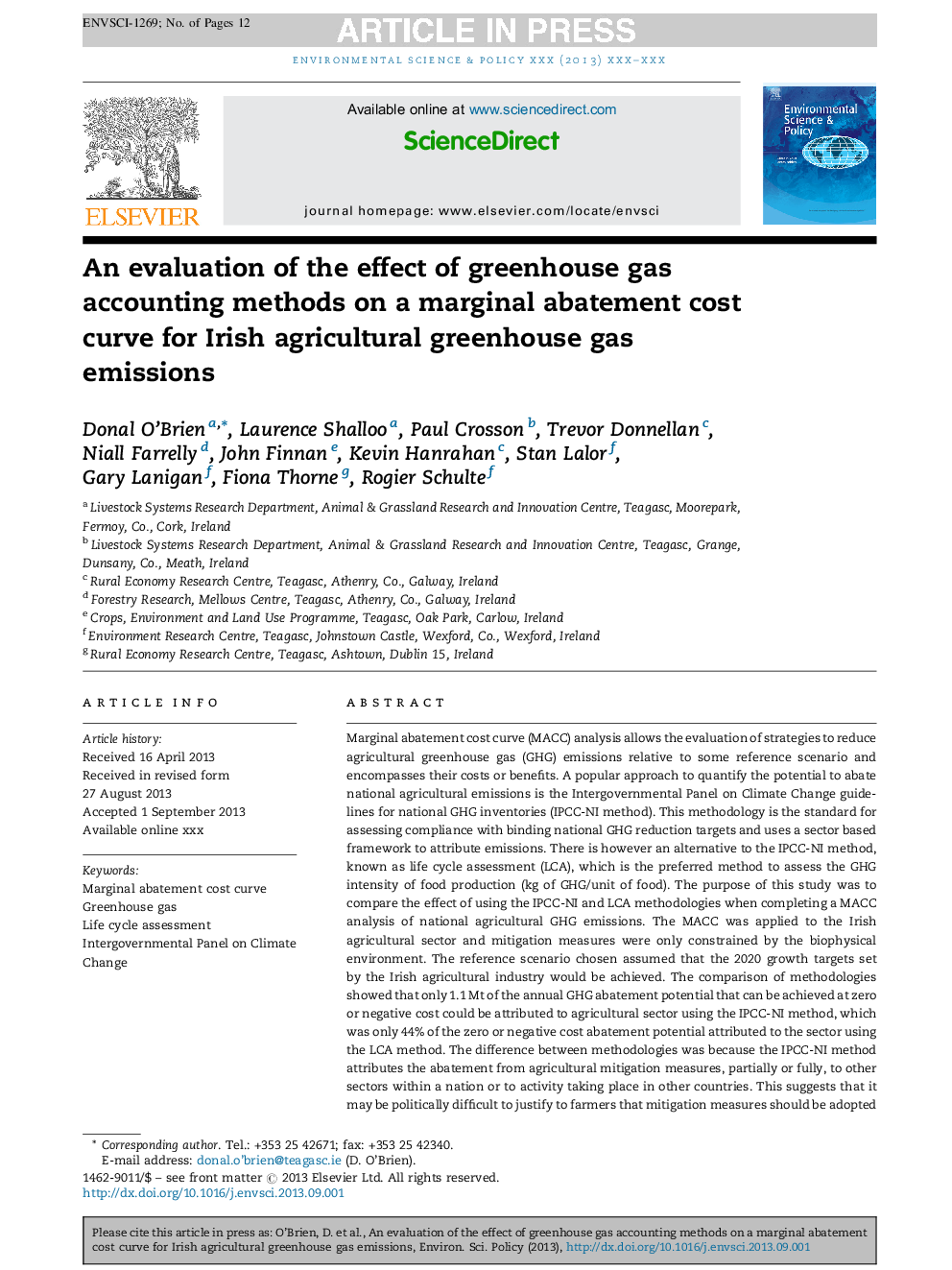| کد مقاله | کد نشریه | سال انتشار | مقاله انگلیسی | نسخه تمام متن |
|---|---|---|---|---|
| 7467852 | 1485067 | 2014 | 12 صفحه PDF | دانلود رایگان |
عنوان انگلیسی مقاله ISI
An evaluation of the effect of greenhouse gas accounting methods on a marginal abatement cost curve for Irish agricultural greenhouse gas emissions
ترجمه فارسی عنوان
ارزیابی تأثیر روش های حسابداری گازهای گلخانه ای بر منحنی هزینۀ هزینه های محدود برای تولید گازهای گلخانه ای کشاورزی ایرلند
دانلود مقاله + سفارش ترجمه
دانلود مقاله ISI انگلیسی
رایگان برای ایرانیان
کلمات کلیدی
منحنی هزینه تضعیف حاشیه، گاز گلخانه ای، ارزیابی چرخه حیات، هیئت بین دولتی در مورد تغییرات اقلیمی،
موضوعات مرتبط
مهندسی و علوم پایه
مهندسی انرژی
انرژی های تجدید پذیر، توسعه پایدار و محیط زیست
چکیده انگلیسی
Marginal abatement cost curve (MACC) analysis allows the evaluation of strategies to reduce agricultural greenhouse gas (GHG) emissions relative to some reference scenario and encompasses their costs or benefits. A popular approach to quantify the potential to abate national agricultural emissions is the Intergovernmental Panel on Climate Change guidelines for national GHG inventories (IPCC-NI method). This methodology is the standard for assessing compliance with binding national GHG reduction targets and uses a sector based framework to attribute emissions. There is however an alternative to the IPCC-NI method, known as life cycle assessment (LCA), which is the preferred method to assess the GHG intensity of food production (kg of GHG/unit of food). The purpose of this study was to compare the effect of using the IPCC-NI and LCA methodologies when completing a MACC analysis of national agricultural GHG emissions. The MACC was applied to the Irish agricultural sector and mitigation measures were only constrained by the biophysical environment. The reference scenario chosen assumed that the 2020 growth targets set by the Irish agricultural industry would be achieved. The comparison of methodologies showed that only 1.1 Mt of the annual GHG abatement potential that can be achieved at zero or negative cost could be attributed to agricultural sector using the IPCC-NI method, which was only 44% of the zero or negative cost abatement potential attributed to the sector using the LCA method. The difference between methodologies was because the IPCC-NI method attributes the abatement from agricultural mitigation measures, partially or fully, to other sectors within a nation or to activity taking place in other countries. This suggests that it may be politically difficult to justify to farmers that mitigation measures should be adopted in agriculture, if the accounting process does not credit this mitigation to them. The disagreement between methodologies also indicates that unilateral national or regional policies to reduce agricultural GHG emissions based on the IPCC-NI method could lead to mitigation options that increase global emissions (carbon leakage). The limitations of the IPCC-NI method for assessing national agricultural GHG emissions could be overcome by reforming or expanding the accounting methodology to include domestic offsetting and to assess emissions associated with national consumption via LCA. This would overcome the problem of carbon leakage and credit (in part) agricultural practices that reduce emissions in other sectors or nations without emission caps.
ناشر
Database: Elsevier - ScienceDirect (ساینس دایرکت)
Journal: Environmental Science & Policy - Volume 39, May 2014, Pages 107-118
Journal: Environmental Science & Policy - Volume 39, May 2014, Pages 107-118
نویسندگان
Donal O'Brien, Laurence Shalloo, Paul Crosson, Trevor Donnellan, Niall Farrelly, John Finnan, Kevin Hanrahan, Stan Lalor, Gary Lanigan, Fiona Thorne, Rogier Schulte,
